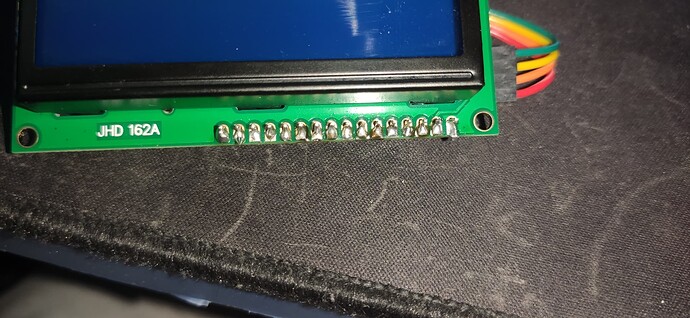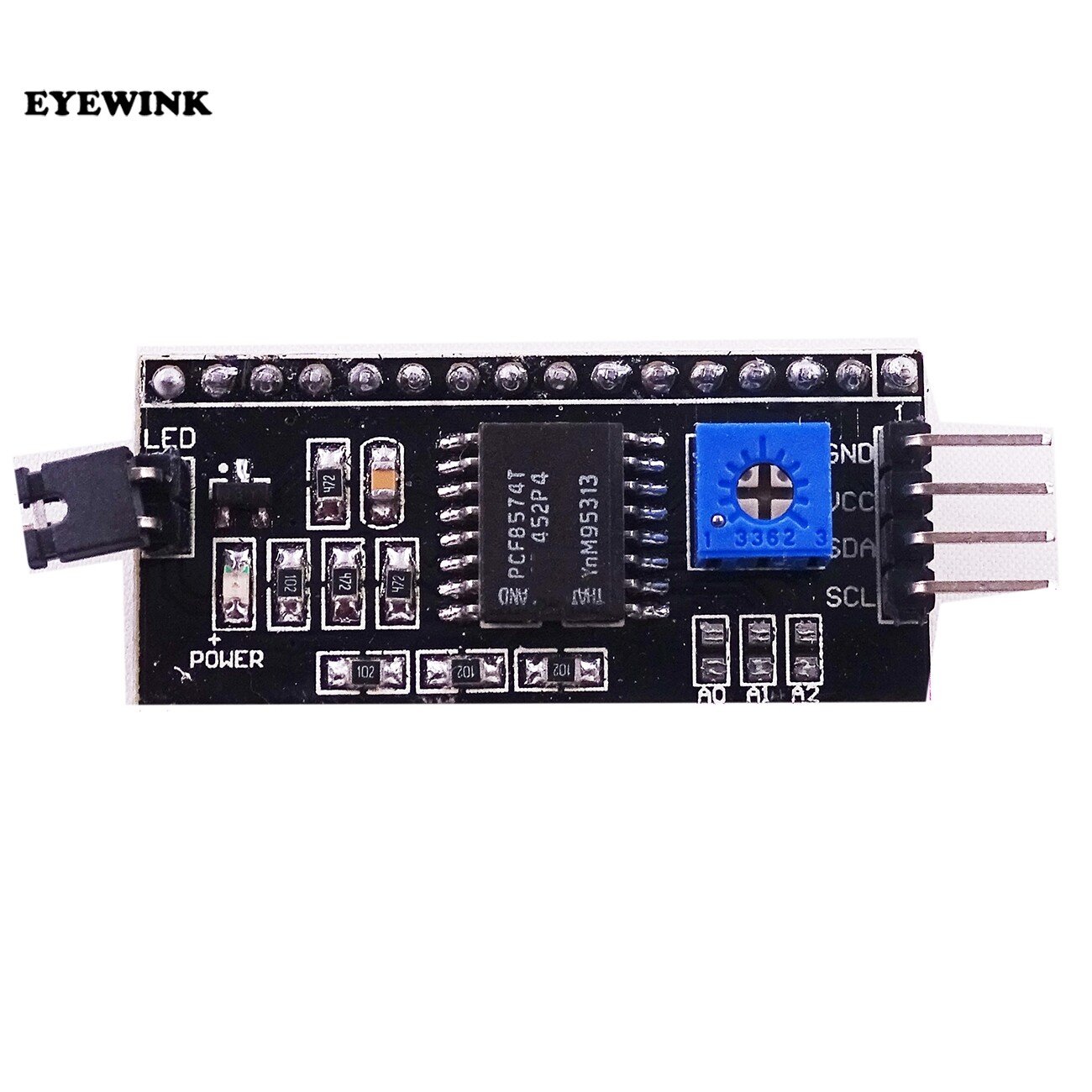Please help my LCD only display blocks (connected with I2C module)
I'm pasting the I2CexpDiag of my LCD Display using hd44780 library.
No⸮
********************************************************************
Serial Initialized
--------------------------------------------------------------------
I2CexpDiag - i2c LCD i/o expander backpack diagnostic tool
--------------------------------------------------------------------
hd44780 lib version: 1.3.2
--------------------------------------------------------------------
Reported Arduino Revision: 1.8.20
CPU ARCH: AVR - F_CPU: 16000000
--------------------------------------------------------------------
SDA digital pin: 18 A4
SCL digital pin: 19 A5
--------------------------------------------------------------------
Checking for required external I2C pull-up on SDA - YES
Checking for required external I2C pull-up on SCL - YES
Checking for I2C pins shorted together - Not Shorted
--------------------------------------------------------------------
Scanning i2c bus for devices..
i2c device found at address 0x27
Total I2C devices found: 1
--------------------------------------------------------------------
Scanning i2c bus for all lcd displays (4 max)
LCD at address: 0x27 | config: P01245673H | R/W control: Yes
Total LCD devices found: 1
--------------------------------------------------------------------
LCD Display Memory Test
Display: 0
Walking 1s data test:
Compare error: addr: 0 read 22 != wrote 1
Compare error: addr: 0 read 22 != wrote 2
Compare error: addr: 0 read 22 != wrote 4
Compare error: addr: 0 read 22 != wrote 8
Compare error: addr: 0 read 22 != wrote 10
Compare error: addr: 0 read 22 != wrote 20
Compare error: addr: 0 read 22 != wrote 40
Compare error: addr: 0 read 22 != wrote 80
Compare error: addr: 40 read 22 != wrote 1
Compare error: addr: 40 read 22 != wrote 2
Compare error: addr: 40 read 22 != wrote 4
Compare error: addr: 40 read 22 != wrote 8
Compare error: addr: 40 read 22 != wrote 10
Compare error: addr: 40 read 22 != wrote 20
Compare error: addr: 40 read 22 != wrote 40
Compare error: addr: 40 read 22 != wrote 80
Compare error: addr: 10 read 22 != wrote 1
Compare error: addr: 10 read 22 != wrote 2
Compare error: addr: 10 read 22 != wrote 4
Compare error: addr: 10 read 22 != wrote 8
Compare error: addr: 10 read 22 != wrote 10
Compare error: addr: 10 read 22 != wrote 20
Compare error: addr: 10 read 22 != wrote 40
Compare error: addr: 10 read 22 != wrote 80
Compare error: addr: 50 read 22 != wrote 1
Compare error: addr: 50 read 22 != wrote 2
Compare error: addr: 50 read 22 != wrote 4
Compare error: addr: 50 read 22 != wrote 8
Compare error: addr: 50 read 22 != wrote 10
Compare error: addr: 50 read 22 != wrote 20
Compare error: addr: 50 read 22 != wrote 40
Compare error: addr: 50 read 22 != wrote 80
FAILED
Address line test:
Compare error: addr: 0 read 22 != wrote 0
Compare error: addr: 1 read 22 != wrote 1
Compare error: addr: 2 read 22 != wrote 2
Compare error: addr: 3 read 22 != wrote 3
Compare error: addr: 4 read 22 != wrote 4
Compare error: addr: 5 read 22 != wrote 5
Compare error: addr: 6 read 22 != wrote 6
Compare error: addr: 7 read 22 != wrote 7
Compare error: addr: 8 read 22 != wrote 8
Compare error: addr: 9 read 22 != wrote 9
Compare error: addr: B read 22 != wrote B
Compare error: addr: C read 22 != wrote C
Compare error: addr: E read 22 != wrote E
Compare error: addr: F read 22 != wrote F
Compare error: addr: 10 read 22 != wrote 10
Compare error: addr: 11 read 22 != wrote 11
Compare error: addr: 12 read 22 != wrote 12
Compare error: addr: 13 read 22 != wrote 13
Compare error: addr: 14 read 22 != wrote 14
Compare error: addr: 15 read 22 != wrote 15
Compare error: addr: 16 read 22 != wrote 16
Compare error: addr: 17 read 22 != wrote 17
Compare error: addr: 18 read 22 != wrote 18
Compare error: addr: 19 read 22 != wrote 19
Compare error: addr: 1A read 22 != wrote 1A
Compare error: addr: 1B read 22 != wrote 1B
Compare error: addr: 1C read 22 != wrote 1C
Compare error: addr: 1D read 22 != wrote 1D
Compare error: addr: 1E read 22 != wrote 1E
Compare error: addr: 1F read 22 != wrote 1F
Compare error: addr: 20 read 22 != wrote 20
Compare error: addr: 21 read 22 != wrote 21
Compare error: addr: 23 read 22 != wrote 23
Compare error: addr: 24 read 22 != wrote 24
Compare error: addr: 25 read 22 != wrote 25
Compare error: addr: 26 read 22 != wrote 26
Compare error: addr: 27 read 22 != wrote 27
Compare error: addr: 40 read 22 != wrote 40
Compare error: addr: 41 read 22 != wrote 41
Compare error: addr: 42 read 22 != wrote 42
Compare error: addr: 43 read 22 != wrote 43
Compare error: addr: 44 read 22 != wrote 44
Compare error: addr: 45 read 22 != wrote 45
Compare error: addr: 46 read 22 != wrote 46
Compare error: addr: 47 read 22 != wrote 47
Compare error: addr: 48 read 22 != wrote 48
Compare error: addr: 49 read 22 != wrote 49
Compare error: addr: 4A read 22 != wrote 4A
Compare error: addr: 4B read 22 != wrote 4B
Compare error: addr: 4C read 22 != wrote 4C
Compare error: addr: 4D read 22 != wrote 4D
Compare error: addr: 4E read 22 != wrote 4E
Compare error: addr: 4F read 22 != wrote 4F
Compare error: addr: 50 read 22 != wrote 50
Compare error: addr: 51 read 22 != wrote 51
Compare error: addr: 52 read 22 != wrote 52
Compare error: addr: 53 read 22 != wrote 53
Compare error: addr: 54 read 22 != wrote 54
Compare error: addr: 55 read 22 != wrote 55
Compare error: addr: 56 read 22 != wrote 56
Compare error: addr: 57 read 22 != wrote 57
Compare error: addr: 58 read 22 != wrote 58
Compare error: addr: 59 read 22 != wrote 59
Compare error: addr: 5A read 22 != wrote 5A
Compare error: addr: 5B read 22 != wrote 5B
Compare error: addr: 5C read 22 != wrote 5C
Compare error: addr: 5D read 22 != wrote 5D
Compare error: addr: 5E read 22 != wrote 5E
Compare error: addr: 5F read 22 != wrote 5F
Compare error: addr: 60 read 22 != wrote 60
Compare error: addr: 61 read 22 != wrote 61
Compare error: addr: 62 read 22 != wrote 62
Compare error: addr: 63 read 22 != wrote 63
Compare error: addr: 64 read 22 != wrote 64
Compare error: addr: 65 read 22 != wrote 65
Compare error: addr: 66 read 22 != wrote 66
Compare error: addr: 67 read 22 != wrote 67
FAILED
Memory test failures are usually due to poor solder connections
Most common cause is poor solder joints on pins soldered to the LCD
--------------------------------------------------------------------
No working LCD devices //



